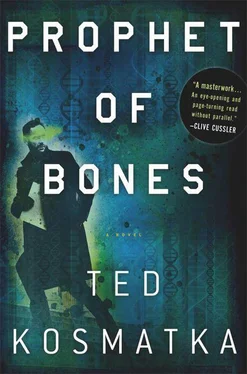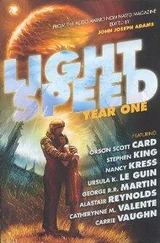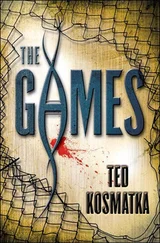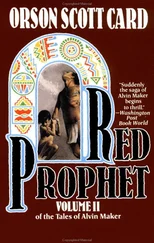“What are we doing?” Lilli asked finally.
“We’re hoping to get lucky,” Paul said, checking his mirror again.
At that moment, they came to a green light, and Paul saw a black SUV stopped at the intersection. It was a different truck: no sideswipe damage to the rear, but the same make and model.
“I should have known that wasn’t gonna happen,” Paul said.
He yanked the wheel to the left, turning against another one-way—this one less crowded. The truck gunned its way across the intersection behind them, giving chase. Paul floored the accelerator again.
“If you’ve got any ideas,” Paul said. “Now is the time.”
“Ideas for what?”
“On how to get out of here.”
In the rearview, the black truck was gaining on them.
“Turn here,” she said.
“Up there?”
“No, right here. Here! ”
Paul jerked the wheel and stomped on the accelerator again, hurtling down a narrow access road. Here the buildings were closed in; no traffic, but parked box trucks crowded along the walls of the buildings.
“There’s an underground station up ahead,” Lilli said.
“Where?”
They bounced across an intersection without slowing, going momentarily airborne as the car’s suspension lifted the tires from the roadway. They struck with a loud scrape, and Paul fought with the wheel as they flew down the access road. Ahead, the roadway became even narrower, reduced to little more than an alley between buildings. Dumpsters bulged out from either side, and Paul had to swerve to avoid striking them. The speedometer climbed to forty. Behind them, the larger vehicle lost ground, half a block back now as it slowed to avoid a dumpster.
“Look out!”
Paul jerked his gaze forward again and dodged another trash container.
Ahead, the road ended in a T. Cross-traffic sat in gridlock. Paul skidded to a stop.
They sat breathing for a moment.
They looked at each other.
Paul glanced in the rearview mirror again. They were out of time.
“Out,” Paul said. “Now.”
They flung the car doors open and sprinted up the street, abandoning the car where it sat. Lilli ran to the right, and Paul followed. Somewhere behind them, a car horn started blaring, but Paul didn’t look back. He followed Lilli up the block, weaving through the foot traffic toward the tunnel entrance. They were near Millennium Park—the Bean, he knew, would be shining in the sun up ahead. He looked toward the stairwell. The sign above the opening read MILLENNIUM STATION. Lilli never hesitated.
He followed her down the stairs and into the underground station, the great maw of the city swallowing them whole.
* * *
They kept moving, that was the important thing, following the stripes on the floor as they tunneled deeper into the station. Shops molded themselves to the walkway perimeter, becoming part of the circulinear passageway that wound its way forward.
A minute later, Paul and Lilli were at the commuter trains. Paul saw that the far train was boarding, so he and Lilli wormed themselves into the shuffling crowd. They stepped onto the train, among the last to board. The doors closed behind them.
Paul was drenched in sweat, his heart pulsing in his ears. He tried to control his breathing, imagining that every eye was on them. He moved forward through the train, trying to pick the most crowded car.
“Here,” he said finally.
They sat, taking the last open seats.
A moment later the South Shore announcer spoke: “Now leaving. Next stop Van Buren.”
Out on the platform, Paul saw a suited man walk by. The man was craning his neck, looking into the train cars. He continued on, disappearing from sight, moving toward the front of the train. Just then, the train lurched forward.
A few moments later, the man came into view again. He was standing in place, staring into the train cars as they slowly lumbered past.
Paul sank as low into the seat as he could go. There was no place to hide.
The car rolled slowly forward and the man’s eyes found Paul. Recognition. The man’s expression went angry.
Paul saw that it was the guy he’d scraped off against the sport ute. The side of his face was red and raw.
The man lunged for the doors, running alongside, trying to open them, but the train quickly pulled ahead.
The man continued to follow, sliding farther and farther back as he ran, his eyes finding Paul again, until he ran out of platform and stopped. Paul put his face to the glass and watched him disappear.
* * *
The train rocked beneath them, a gentle lull. The sound of the tracks.
The train emerged into open air. Buildings flew by.
“They won’t have enough men to check every stop,” Paul said. “The farther we go, the wider the net they’d have to cast in order to catch us.”
“So you think we got away?”
“We’ll know at the first stop. If one of them boards the train, then no.”
Lilli put her head on his shoulder. They passed beneath a broad overpass, the world going dark for a moment before they came out the other side.
The conductor worked his way up the line.
“Tickets?”
“We don’t have any. Can we buy them now?”
“Sure, where to?”
“Where’s the train going?”
“After Van Buren, the next stop is Fifty-seventh Street.”
“No, farther up.”
“Hegewisch, Hammond, East Chicago, Ogden Dunes, Michigan City.”
“Two tickets to Ogden Dunes.”
“Sixteen dollars.”
Paul paid in cash. The conductor handed over the change and the stubs and moved on.
“What about your car back there?” she asked.
“It’s the least of my worries.”
“Van Buren,” announced a catenated male voice.
The train slowed to a stop. Paul and Lilli stared out the windows. No black trucks. No athletic men in dark suits.
The train doors opened. People got on, but nobody suspicious. After a minute, the doors closed again.
Paul felt Lilli release a long breath. The train started moving again.
“They didn’t get here in time,” Paul said. “Now they won’t know if we’ve gotten off already or not. After this, it gets harder for them.”
They took the train through two more stops.
They watched the buildings through the windows. Tall beige skyscrapers, fire escapes zigzagging up the side. Lake Michigan visible in stolen glimpses through the buildings, until the tracks veered and the neighborhood changed. The tall buildings gave way to smaller structures, brick apartment buildings and houses. The train rolled past a landfill, parklike, covered in green grass, but rising steeply as no park would.
Paul saw liquor stores and gas stations and, later, on the north side of the tracks, power lines and the rise of industrial buildings. The train passed a church, its twin steeples piercing the sky to the south—a huge dark structure with stained-glass windows, beautiful in the slant of the sun.
“Next stop Hegewisch,” a voice called out over the intercom.
Paul and Lilli stayed in their seats.
Sometime after that, the train passed into Indiana, making stops in Hammond and Gary. Through the window, Paul saw enormous pipes and white smoke—huge metal structures that dwarfed all the buildings he’d seen outside of Chicago, like rusting metal skyscrapers laid on their sides. On the roof of one were the words USS GARY WORKS. The great sprawl of the mill rolled by for miles.
Paul looked around at the other travelers. The South Shore was a commuter train. People coming from and going to work. Men and women going about their daily lives.
“Who died?” Lilli asked.
Paul looked at her. Her face was somber. “What?”
“You said the last guy who helped you is dead.” Her voice went low, almost a whisper, so the other passengers couldn’t hear her. “Who was he?”
Читать дальше












